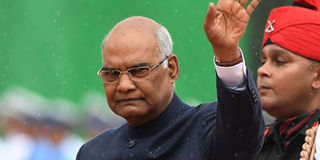This is why newly elected Indian president is not an untouchable

India's new President Ram Nath Kovind waves while inspecting a guard of honour during a ceremony at the Presidential Palace in New Delhi on July 25, 2017. AFP simply said he was “chosen from the bottom of the Hindu caste system”. PHOTO | PRAKASH SINGH | AFP
What you need to know:
- President Kovind is a senior lawyer and former governor of Bihar State.
- In 1997, Kocheli Raman Narayanan was elected the 10th president of India.
The Saturday Nation of July 29 described Ram Nath Kovind as the “‘Untouchable’ president” in a picture caption on page 40.
Gaurav Marwaha wrote to complain it was offensive to describe the newly elected Indian president as “untouchable”.
OUTLAWED
The term is ancient and outlawed, he said, and should not be used by a leading newspaper.
“I believe it’s important that the experienced and prudent editorial staff of the Nation must take due diligence in publishing content that is well-researched, progressive and resonates with reality.”
The term “untouchable” and untouchability were banned 67 years ago.
DALIT CASTE
With that in mind, I checked how other leading news organisations referred to President Kovind.
I found the Nation was not alone in referring to the Indian president as “untouchable”.
The headline in NBC News was: “India Elects ‘Untouchable’ President From Lowest ‘Dalit’ Caste”.
14TH PRESIDENT
USA Today was more prudent though it still used the term.
“India elects Ram Nath Kovind, a member of ‘untouchable’ class, as president,” it said in a headline.
The New York Times was even more circumspect.
“India Picks Ram Nath Kovind, of Caste Once Called ‘Untouchables,’ as President”, it said in a headline, adding:
“A Dalit was elected India’s 14th president on Thursday, a rare achievement for a member of a community once known as ‘untouchables’ and one of the most deprived groups in India.”
DESCRIBE
CNN, Aljazeera, AFP and two British newspapers, The Independent and The Guardian, did not use the term “untouchable”.
CNN talked of the “man from India’s lowest caste elected president”.
AFP simply said he was “chosen from the bottom of the Hindu caste system”.
The Independent said in a headline: “Member of India’s lowest caste elected president”.
The Guardian described him as a “member of India’s lowest caste”.
COMMUNITY
The Hindu, an English-language paper considered to be one of the most influential dailies in India, described Kovind as “low-profile”.
The Times of India, the third biggest daily newspaper in India, like the AFP, described him as “new president from bottom of Hindu caste system”.
So the Nation was in some good company. But was it in order to describe President Kovind as “untouchable”?
The appellation was the name given to a member of the Dalit community, traditionally the lowest class in the social system of Hindu India.
OCCUPATION
Dalits were considered — and are still considered in some parts of India — inferior because of their traditional occupations such as working as scavengers, removers of human waste, street sweepers, cobblers and leather workers.
But the term was banned when India adopted its constitution in 1950, some three years after independence.
The term has other meanings. It means, according to Cambridge and Oxford dictionaries, “not able to be punished, criticised, or changed in any way” as in “The politician believed the police would never arrest him, that he was untouchable”.
INFERIOR
It also means “unable to be matched or rivalled”, as in “Kenyan runners are untouchable”.
But there is no doubt what meaning the Saturday Nation intended — that President Kovind is vile and inferior according to the Hindu social system.
Though a member of the Dalit community, the Indian president cannot realistically be described as “untouchable”, even assuming a sub-editor in Kenya can properly use the term to describe him.
NARAYANAN
President Kovind is a senior lawyer and former governor of Bihar State.
What’s even more compelling, he is not the first Dalit to be elected president.
In 1997, Kocheli Raman Narayanan was elected the 10th president of India.
ABUSIVE
For the Nation to call Kovind “‘Untouchable’ president” is the equivalent of calling Barack Obama the ‘Negro president’ when he was elected the 44th president of the US.
Of course, the Nation would never have dreamt of penning such an abusive term.
That is why, in essence, the Saturday Nation should not have referred to President Kovind as “untouchable”.
Send your complaints to [email protected]. Text or call 0721 989 264.




